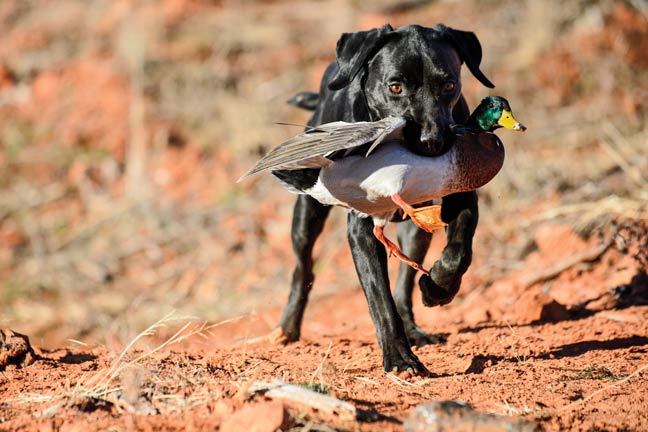August 18, 2016
By Tyler Shoberg
I'll never forget the 2015 duck opener.
After a fruitful morning, my younger dog, Blitz, began whining. I brushed it off until he began twitching — spasms that started and stopped just as suddenly. It was time to go.
Halfway back to the pickup truck, he convulsed hard and fell over. His body turned rigid, eyes bulged, mouth foamed, and his bladder emptied.

Advertisement
Blitz was having a seizure, and I had no idea what to do. Since then, I've become considerably more educated on the subject, and here's how you should respond.
1. Don't Panic
The worst thing you can do when your dog has a seizure is panic and start yelling for help. Yes seizures are traumatic, but you're not doing any good by freaking out. I should have calmly sat beside my dog and talked to him in a low, soothing voice until the seizure subsided.
Advertisement
2. Keep Your Distance
I was worried Blitz wasn't breathing, so as he was seizing and started to come to I put my ear directly next to his mouth. This was foolish. Dogs are completely disoriented when they come out of a seizure and may snap or bite. Blitz, however, could barely open his mouth. I got off lucky.
3. Find Some Shade
It was an abnormally warm day for late September in North Dakota and after we got Blitz back to the truck, I set him on the road — in the sun. What I found out later from my vet was dogs can overheat during a seizure. Blitz couldn't pant at the time, so I didn't know he was probably burning up inside. Get your dog to shade or, better yet, the air-conditioned cab of your truck. Running cool water on paws works, too.
4. Call The Vet
Don't waste time talking to anyone but a veterinarian. Ours directed us to watch Blitz for the next several hours. If he wasn't close to normal within two hours — walking around, more "with it," and able to drink or eat on his own — we needed to bring him in. And if another seizure occurred during the following 24 hours, that was an emergency situation.
The Result
Blitz recovered by the time we arrived home, and to this day he's had no long-term effects. However, that lone instance was an eye-opener.
Seizures in dogs are not all that uncommon. In fact, some breeds can be genetically predisposed to them, including Labrador retrieves, golden retrievers and various spaniel varieties. A vet will be able to run blood tests to find that out, and there are prescriptions that can help.
Blitz's incident, however, was nutrition related. The vet believed his electrolytes were out of whack. Going forward, I was instructed to feed him in the morning before the hunt, bring granola bars along as snacks during the day, and always keep some corn syrup on hand. If Blitz started showing signs of seizing again, some corn syrup dabbed on the gums would help alleviate or shorten the seizure.
Seizures aren't something to be taken lightly, so be sure you're prepared to take care of your hunting partner if the unthinkable happens afield.

